I would dearly love to know the story behind this car. Who decided to keep an example of one of the “top automotive engineering failures” in such pristine and gorgeous shape? It’s located in Greenlawn, New York and is listed here on eBay with a buy-it-now of only $3,995. The car looks stunning in the pictures, with minor cleanup needed for it to be in what I would consider show (not showroom) condition. It has 64,850 miles and has been in Kansas, where it was driven sparingly and garaged every winter. It was obviously used to tow a trailer at some point, which may account for the owner-added gauges. The original window sticker is there as well, and you can see it in the video the seller has posted, as well as hear the Delta 88 start and run. It’s just as noisy as I remember them being! There are some enthusiasts out there for the Olds diesels, so if you like the looks of this one, you’ll have some assistance in keeping it going. Do any of you remember these personally, and would you be willing to do what it takes to keep this one in survivor condition?
- Maybe this was your fathers?
- Trailering past
- “Wire” wheel covers
- No rust!
- Even the dash is clean
- 125 clattering HP!
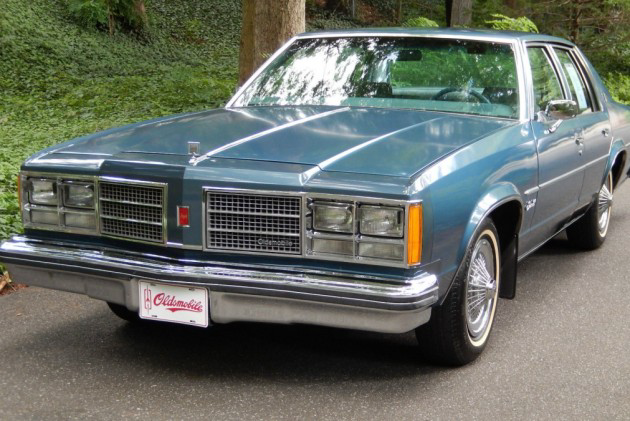

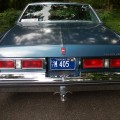
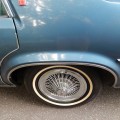
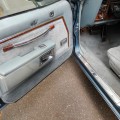
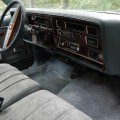
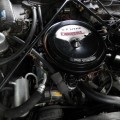






Oh god, I got several in the salvage yard no one asks about them or even touches them they just take us space and I don’t think a single one came in running
Got any injectors for a DX? lol
any 1978 oldsmobile diesels in your salvage yard?….looking for parts specific to the 1978 diesel. thanks. eddie
Crush them, for the love of humanity! !!!
The most mis-understood and hated vehicle- Two, well three faults in the cars- cylinder head needed re-torque on a regular basis and they needed water separators. Poorly trained mechanics condemned them as gas engines converted. Water can not be compressed and 22:1compression and bad head gasket design was the killers. Mixing unleaded fuel so they would start easier as suggested was a possible hazard.
This is a shoo-in for some kind of prize at a Concours d’Lemons near you.
I can’t remember the last time I saw one of these in running condition. I do remember that a manufacturing manager at my first post-college job drove one, and he loved it. He claimed that it was dead reliable, and that was due to him driving it gently and not beating on it. I don’t know if that’s really the case or if he was just lucky.
Diesel or no, it’s in fantastic shape and has to be worth the asking price all day long, just for the novelty of the thing.
Is it true that GM put different heads on their gas engines to make their really bad diesels? That is what remember hearing.
Actually, the problem is they DIDN’T change the head design…or the rods…or the head studs/bolts…
The bottom end of the engine was pretty sound (especially the 81-85 DX). The heads would hold well if you put ARP Studs in… The rods would have held up as long as you didn’t get water in there. Lack of a water separator killed a lot of these engines.
One of the popular stories for the failure of this engine is that GM used a gas engine as the basis for the design. That by itself would not explain the catastrophe.
The Mercedes OM 636 diesel (used in 170’s and 180 Ponton’s) was based on a gas engine with only 3 main bearings and which debuted as a gasoline flathead. The conversion to diesel required a change to OHV and block castings made thicker all over (but no extra mains). The crankshaft was also beefed up substantially.
So a gas engine can be converted to diesel, GM just failed to execute the change correctly.
i would use this as a daily driver. there is a caddy from this time frame with a diesel being used year round in my town. the seller might do better with an auction style listing but you can always make the seller an offer. nice find.
I remember taking a test drive, and being impressed by the torque. My family was looking at a replacement for our ’71 Delta 88 in the middle of the ’79 oil crisis, and this seemed like a possibility.
Great looking example. If GM had figured out how to make a bulletproof diesel, this might have been a classic.
My friend’s Mom got one of these as a wagon. I seem to remember the owner’s manual saying that you would void the warranty if you towed anything with it.
I also remember, she forgot once and filled the tank with unleaded. Had to be towed in and drained.
My best friend’s Mom had a brown one – the engine sounded like there were marbles in the cylinders. Or clackers. They kept cars a long time in that family, except for this one.
The biggest problem with these engines was GM did not stress the difference in maintenance procedures. The early engines had a “D” code engine block. This block had smaller crank bearings that required a diesel grade motor oil (api service grade CC). This bit of information was in the owners manual and widely ignored by Olds dealers and owners alike. The block was changed about 1980 to a “DX” code. That block had wider bearings that could use gas grade “SE” oil. The water separator that all commercial diesels have was never added to these cars. The water that was common in diesel fuel was just passed on to the engine. It would collect there until hydrolock blew a head gasket, if you were lucky. Most mechanics would replace the head gasket with a new one and reuse the existing head bolts. The head bolts were “torque to yield’ type and should never be reused. This repair would never last and caused many to think the engine was hopeless. While the Olds Diesel was not built to outlast a Cummins truck engine, it was not as bad as most believed. Rant over.
Thanks for the detailed info, Ed P! My wife was looking this one over yesterday (she has a thing for boxy GM full size cars)…if we weren’t in the middle of building a house…oh well.
I worked for a GM dealership as a tech during the 80’s. We were sent for training on these diesel engines. So all these comments about all the mechanics not knowing how to work on them or not changing headbolts is false. Some dealerships might have been that way, but the one I worked at wasn’t. We had one tech that was dedicated just to the diesel engines. The engine was based on a gas engine with very little change. It was just one of GM’s failed attempts. And they had a whole lot of them. Remember the GEO Metro Convertible? It plainly stated in the owners manual in big black letters. This car will leak inside when it rains.
They got a bad rap…it was a poorly-designed diesel but generally broke prior to 50,000 miles. If they ran beyond that, they continued to run….most probs were due to owners who didn’t understand diesels. I used to get these things from an Olds dealer scrap pile and convert ’em for gas drag motors. This is a beautiful car and I would run it ’til it died(if it did) and then convert it to a 403 gas(many were converted to 350 gas). Our current diesels(Ford 6.0 excluded) are unbelievably advanced and bulletproof compared to these old ones. NICE BUY.
We discussed this topic in depth a while back on Hemmings. Some had great luck with these, amassing hundreds of thousands of miles, some had miserable luck. Cold weather was a huge problem with these, and a lot of damage was done in cold weather startups ( the kiss of death on any diesel). Commenter, (and good friend), geomechs, knows all about these and has a wealth of knowledge. Dare I say, the reason it has such low miles, is it was a hassle to drive (or didn’t run?) This is really a nice car, but ditch the diesel.
A friend had a Cadillac with the diesel engine. At home, he parked in a garage and the diesel started fine in cold weather. His wife used the car and when she went to visit someone and the car sat outside long enough to get cold again, the batteries were not enough to start the car alone. He mounted a large commercial battery charger in the trunk with enough extension cord to reach and outlet to fix the problem (sort of).
You mean he left it plugged-in at home and only drove the distance of the extension cord from home?? lol
My grandmother had one of these diesel Olds, it sat in the garage for a long time, I think my brother finally dug it out and converted it to a gas engine. All I remember is that she was envious of my dad’s VW german built diesel Rabbit, which did work right. But she was a Chevy/GM fan. I doubt she ever understood anything about diesels. Noting that this one originally came from Kansas, it looks a lot like the one my grandmother had, I think they were popular for a short time with the farmers since they could use tractor diesel, which we bought in bulk.
Very interesting comments by people on here who had experience with these Olds diesels. I remember when they came in….and then when they went out.
These were mainly a response to the 1973 oil crisis, and were not made because No Americans liked diesels. I think GM converted the gas engine to diesel mainly because of the rush to get better fuel economy for large No American sedans, and to do it cost-effectively on a gas engine platform. Some of the most interesting discussion here has been about the things that could, and did, go wrong when these engines weren’t used and maintained properly as diesels and were treated more like the gas engines they were developed from.
When I was driving in Europe some years ago most of the cars you saw were diesel. They were developed from the drawing board as diesels, and people knew how to run them as diesels, so they worked well.
Over here that never happened for cars. Too bad, because some of the best cars made today, including some of the best performing cars made, are still diesel. That works because of the great torque diesels can produce. They are more expensive because they need to be made stronger, heavier, and with expensive things like high pressure fuel injection, so I don’t think diesels will ever displace cars in No America. But the heavy truck industry has spoken, and diesel is the only way to go.
Nothing much new to say here but my brother in law had one of these. It ran well and he seemed to like it. The Ohio rust worm got a good bite on the frame and body so it was destined for the scrapyard but, it was still running… just had rust up to the door handles.
I think GM is getting too much credit as for the reason these were rushed into production. GM was not out to do the “consumer” any favors by offering us a diesel, the were getting creamed by the Germans. This was to fight off the 115 chassis MB, and then the 123 chassis diesels that were great cars and would run forever. Not to mention the cheap VW’s. The manufactured gas crisis did get the ball rolling though, as it had been going on for a few years already.
randy, my take on the GM diesels is that the gas economy they supposedly produced was a big part of the attraction. As someone who lived through the various gas crises, I remember the concern, annoyance, and just plain terror that affected people when they had to line up at gas stations and then hope that by the time they got to the pumps there was some gas left for them—and for the jerrycans they had in the trunk. The news shows had views from helicopters of gas station lineups down the block every day for months.
That really affected people for years, and true or false, the fuel efficiency of diesels was a draw for any diesel car that most people had never felt before.
Agreed that GM wasn’t out to do people any favors, and they saw an opportunity to sell some vehicles and make $$$, but only if they could do it by converting gas engines.
I knew a couple of people who owned Rabbit diesels back then, and the cars were so small and incredibly noisy that I think the people who would buy a diesel Rabbit vs. those who went for a big 4-door GM car with the big diesel V8 were two very different kinds of folks. GM people wanted to get good mileage in a big, relatively quiet and comfortable car so they could drive it when they wanted to. The diesel Rabbit people wanted to save the world by using the minimum amount of fuel in a very small car.
That’s why I stated “not to mention rabbit diesels”. The MB 5 cyl diesel was and is a fabulous engine. I lived and bought gas through those years as well, what a farce. Folks in Tx could only buy gas on odd or even days, depending on the last numeral on the license plates. I always had the proper tag for whatever day it was somehow. Those rabbits were noisy, but they ran forever and got ~50mpg. My greatest gripe now is the price of diesel. “They” must be subsidizing something else with the HUGE profits off of diesel at these ridiculous prices.
Only recently have the advanced diesel cars which are common in Europe started making their way to North America in any numbers. It’s my understanding this has been because the European diesel fuel, which is largely made from Russian crude, is lower-sulfur and cleaner than the fuel available in NA. So the vehicles which meet emissions standards on European diesel struggle to do so here. But urea injection (and probably other technologies) are making it possible for more diesel vehicles to pass 50-state standards, which is why we are starting to see more high-tech diesels from companies other than Mercedes and VW, which were the only game in town for diesel cars for quite a while.
It’s interesting to read the comments about these old GM diesels though. Clearly there’s a lot more nuance to the story than just “they were crap, the end.” It seems that as in so many other cases, they had specialized maintenance needs that many people ignored, at their peril.
I had a few of the Oldsmobeater diesels.
They would eat two (2) batteries before lunch in the winter time (Chicago) and for dinner or a snack a few connecting rods too!
Someone once told me there is a lid for every garbage can.
JoeyG…
For some good reading on Olds diesels, just about anything and everything about them was discussed here. Little long, but great reading, clear up a lot of misconceptions. The basic consensus, like Ed sez, was maintenance. http://blog.hemmings.com/index.php/2015/02/19/remember-when-oldsmobile-embraced-the-diesel-engine/
Funny, I was driving in downtown St. Louis a couple of years ago when beside me at a light appears the same vintage Olds diesel, but a wagon. I yelled (had to over the racket…) to the guy” What do you have, the last one?” He grinned and yelled back “It’s only got 70K miles, and I only paid $700 bucks”
I believe that diesel powered cars would be more popular if they were less of a maintenance headache. The only reason to have an owners manual in the glove box is to hide your condoms from your parents. since diesel fuel is the first crack when refining crude oil, it would stand to reason that the price would be lower, however, thank goodness for the EPA in saving us from having fun cars to drive and big oil looking out for the everyday working man when it comes to fuel prices. I have driven some of the later model VW diesels and they have good get up and go, but not for the selling price.
Would that this would’ve had a 403…or least the last-year-in-a Delta R-code 350.
The parents of a high school friend of mine bought a new 78 Delta 88 coupe with the diesel. I remember that 78 as much louder than the later diesel-powered GM cars.
Interestingly, they experienced no issues with the 5.7L diesel (which was very economical) in four years of ownership. The Metric 200 transmission, however, was absolute crap and failed at 16k miles (it was fixed under warranty).
GM basically destroyed the diesel CAR market in the US by the mid to late eighties. For a time, a diesel engine was a $500 deduct for every diesel-powered car but a Mercedes. I found out the hard way when I wanted to sell a very reliable 81 Isuzu I-Mark diesel (not a converted gas motor).
Agree whole-heartedly, maybe that was their intent? They’ve done worse.
We always thought GM released that engine to sabotage the diesel car market in the US. Lots of people bought them back in the day, and there were even some Chevy pick up’s with that engine option. Everyone that I ever knew about failed in a catastrophic manor, usually showering parts and a big puddle of oil all over the highway. Most owners had them converted to 350 Olds gas engines and never looked back. What a POS!
Hi Charles, HA, it’s seems the most logical explanation, but we have to remember, times were changing fast, and at the time, diesel fuel was a lot cheaper than gas, so for most, who knew nothing about diesel’s, were looking at it as strictly a money savings deal. They sure got a rude awakening, when they had to fuel up at those stinky truck stops, as very few gas stations had diesel at the time. I drove trucks for 35 years, and maintenance was the key to long life in a diesel, and many drove them like a gas engine. Cold weather was the kiss of death for these. You never “gun” a cold diesel. Like I say, I heard of properly maintained Oldsmobile diesel’s that had hundreds of thousands of miles on them.
I had one!!!
I had an 1980 Old Cutlass DIESEL 2 door, yes 2 door, and loved it, especially the 40 miles to the gallon, but I had it worked on by GM Trained Diesel Mechanics, right after I bought it, it blew a head gasket, the mechanic that fixed it put in new head bolts and torqued them the required setting, I changed fuel filter every 12000 miles, and ran Shell Roltela oil, which was made for diesel engines. I traded the car off, granted I did not get much for it in cash, but the day I did it had over 200,000 miles only, I traded it for a GMC Truck with a diesel engine in it. OH yeah my Grandfather had a Chevy Caprice with a diesel engine in it and my parents had a Olds 98 with a diesel engine in it. They ever had trouble with them, but having grown up around a farm, we knew how to take care of Diesel engines, they all had block and battery heaters on them and when it got cold you plugged them in, and we also ran diesel fuel treatment in them, especially during the cold Missouri winters. I wish some days that I still had my Olds, it was always funny to pull up to a stop sign, and somebody would look at you and say something like man you sure got a knock in that engine, and when the light would turn green stomp on it and listen to the tire squeal and the black smoke pour out of it, but you only did that after it had been running for a while, also we rigged them up with a fuel switch, and many times you would lock the doors and go in a store but as long as you had the fuel switch on the car would run, but you could not put it in gear unless you put the key in it.
Still have one…
But how about those eyebrows.
Evidently this car did not sell on eBay as it is now for sale on Craigslist. No asking price but lots of pictures. http://longisland.craigslist.org/cto/5780962438.html
I have a 1978 Olds delta 88 Royale. It has a factory 350 gas and runs amazing.
do you still have this car for sale.how can i get a contact number may you please hit me back on my email
I remember my dad having a 79 Olds Custom Cruiser diesel as a company car. We took it on a road trip from Ohio to Florida. It could barely maintain freeway speeds pulling the hills of West Virginia turnpike! So freaking noisy! By time we made it to Florida the entire back of car was covered in black soot! After that lease was up the company leased him an 83 Custom Cruiser & it was just as bad. An 86 Cutlass Cruiser with the indestructible iron duke 4cyl replaced the 83. No power but a solid rock reliable engine.
As someone who has loved these vehicles since I was about 10 when they came out, and who owns six presently, I have felt for the last 45 years that owners failing to follow the maintenance schedule and mechanics that could have been trained better had at least an equal share in the problems with these vehicles.
Having owned several of over the past 30 some years, I can say that I’ve only had significant problems with one — that being a 1979 Seville that I still own which still has its original D-Block engine.
It developed some noticeable play in the connecting rod of the number 7 cylinder, and to a lesser extent the number 8 cylinder, but I caught the problem before it caused significant damage.
I completely concur with previous posts indicating that these vehicles can be very reliable and last well into the six figures if they’re treated properly.
For the curious, my current Fleet contains the aforementioned 1979 Seville, a 1981 Fleetwood Brougham, a 1981 Toronado, a 1983 Toronado, a 1983 Riviera, and, finally, a 1984 Sedan DeVille. 😎